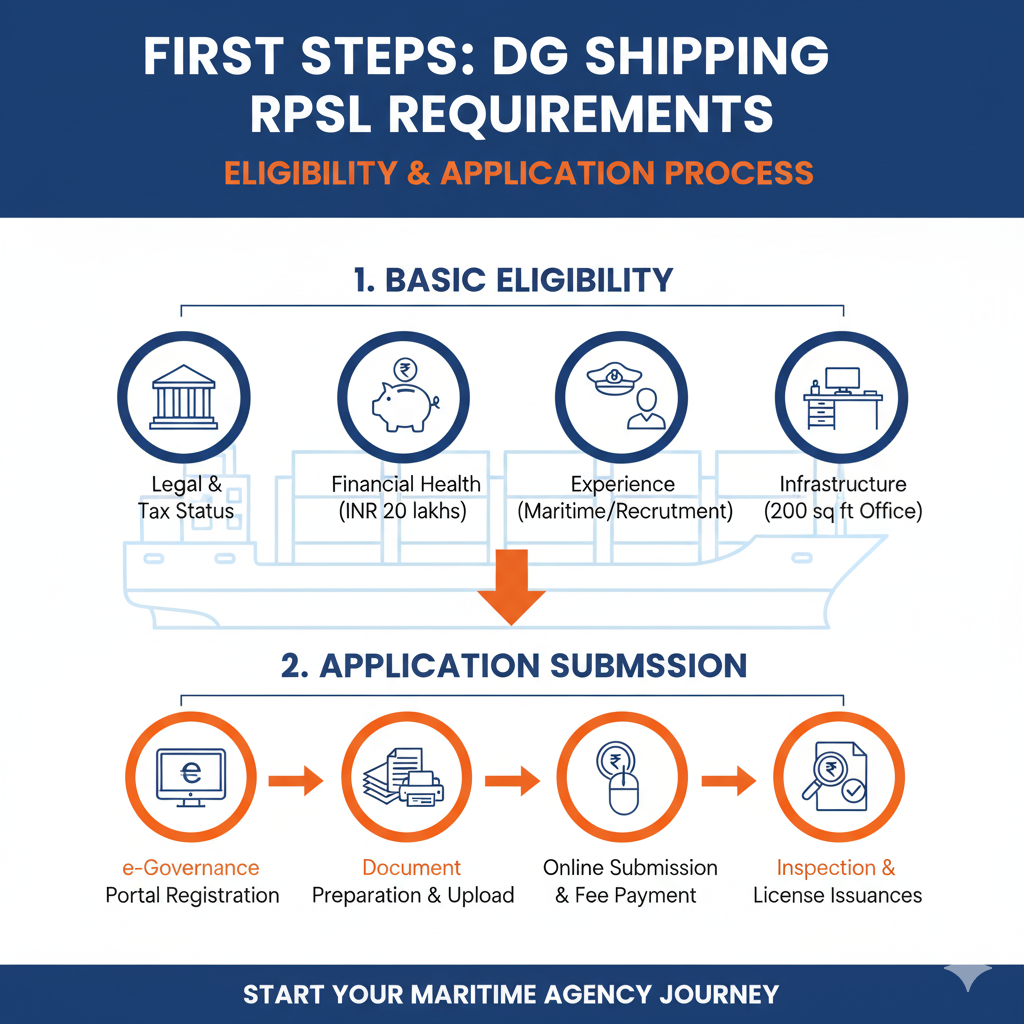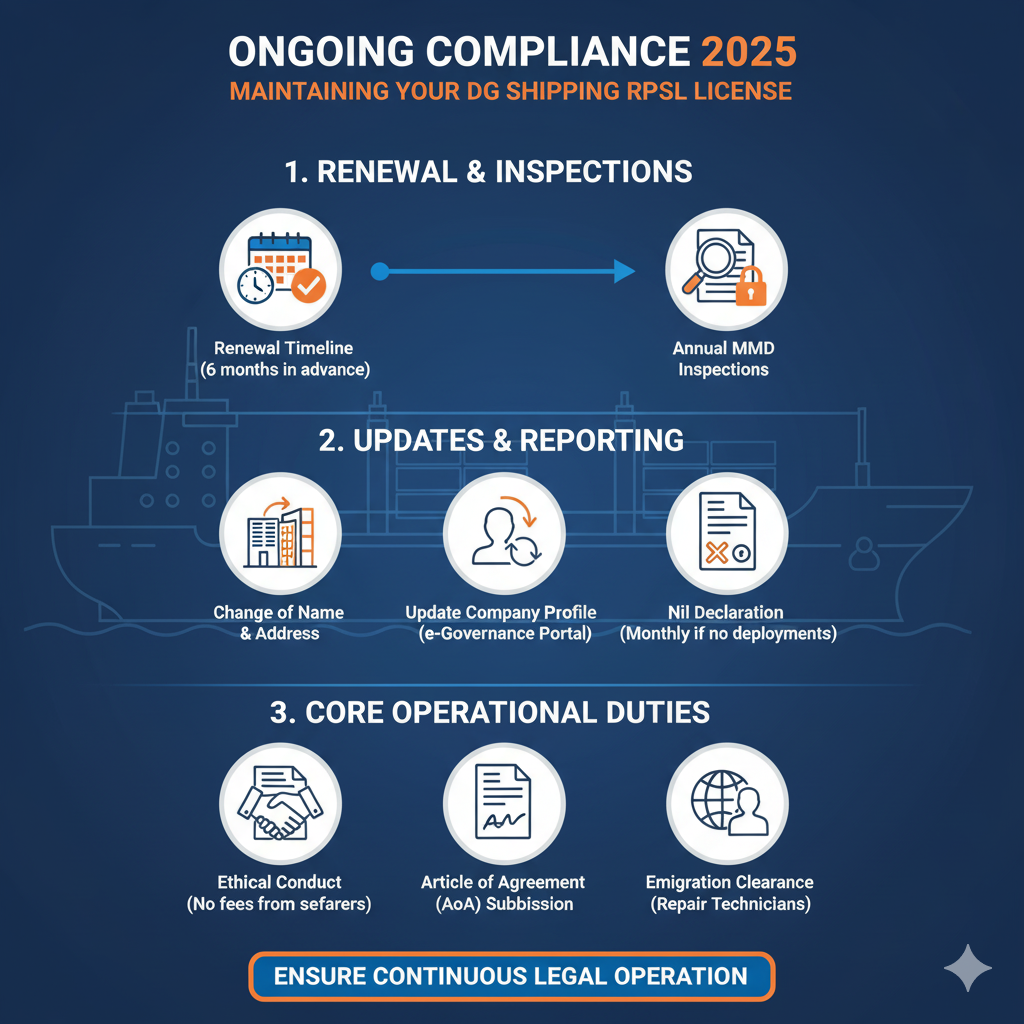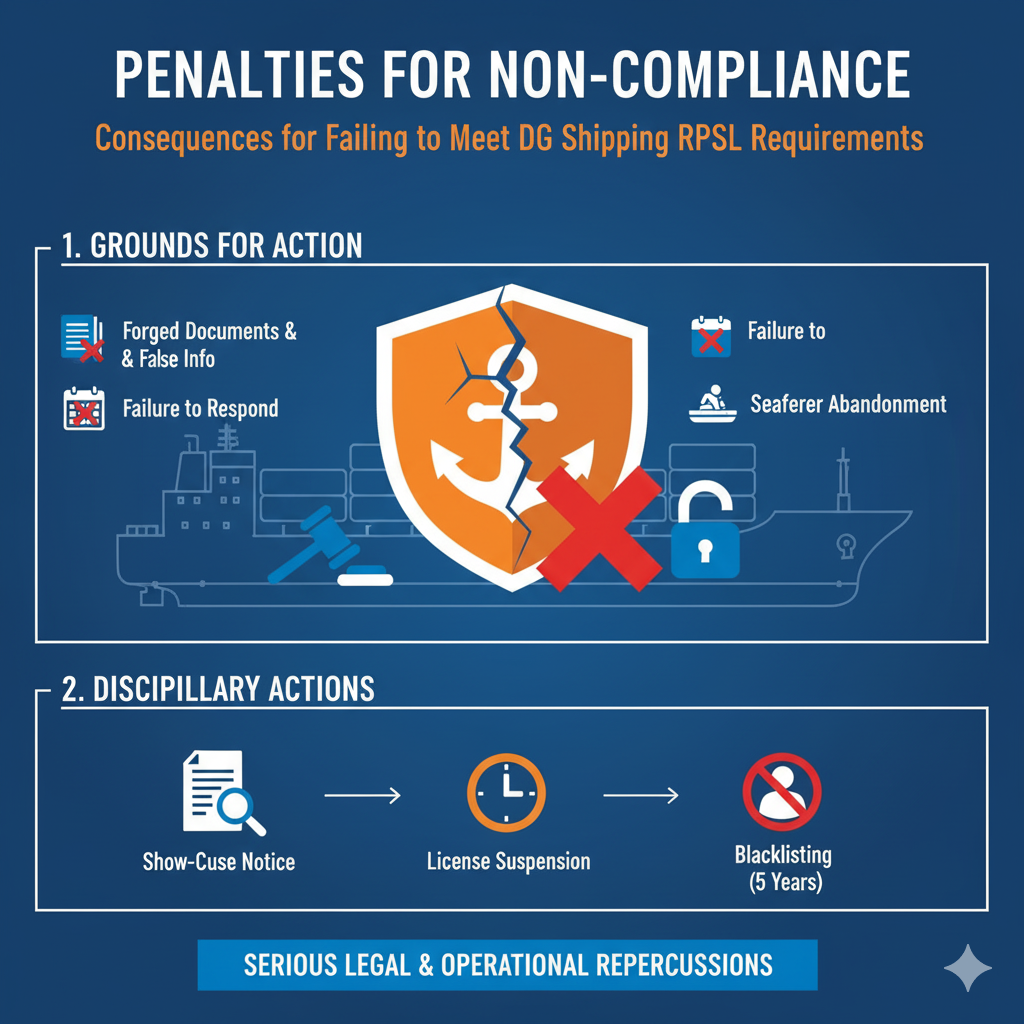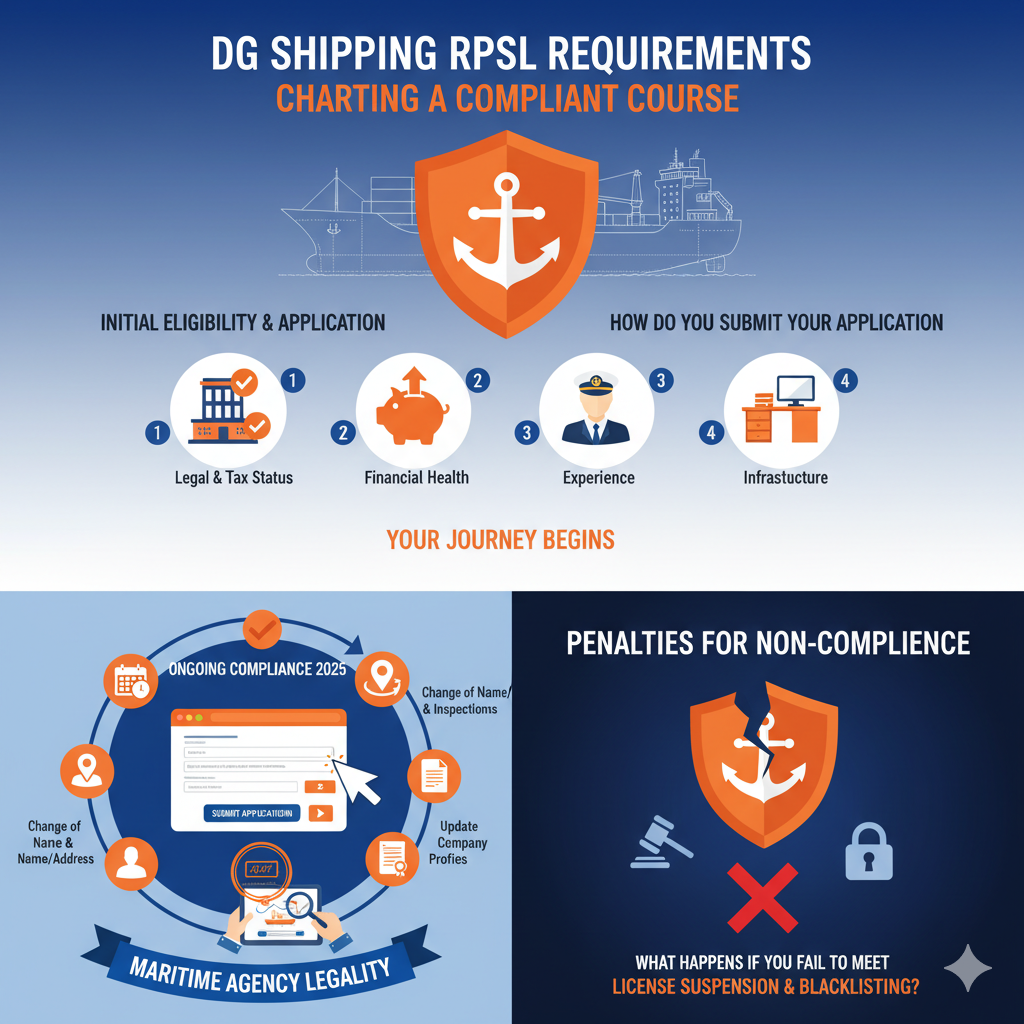To meet the 2025 DG Shipping RPSL requirements, your agency must obtain and maintain a mandatory Recruitment and Placement Service License (RPSL) from the Directorate General of Shipping (DG Shipping). It’s a legal necessity for any company involved in the recruitment and placement of Indian seafarers on both national and international ships.
We’ll cover everything you need to know, from the initial eligibility and application steps to ongoing duties, renewals, and the serious penalties for non-compliance, such as license suspension and blacklisting. Following these rules is essential for ensuring your agency operates legally and maintains good standing.
Why is Understanding the DG Shipping RPSL Requirements Crucial for Your Maritime Agency?
To legally engage in the recruitment and placement of Indian seafarers, companies must obtain a valid RPSL License or recruitment and placement services license) from the Directorate General of Shipping (DG Shipping), Government of India. Adherence to these DG Shipping RPSL requirements is critical to ensure your agency operates legally, like these new RPSL companies, and avoids significant penalties.

What Are the First Steps to Meet the DG Shipping RPSL Requirements?
This section covers the foundational criteria and the application submission process. Meeting the DG Shipping RPSL requirements from the very beginning is a critical step for any maritime recruitment agency.
Does Your Company Meet the Basic DG Shipping RPSL Requirements for Eligibility?
Before beginning the application, your company must meet several foundational eligibility criteria.
- Legal & Tax Status: Your agency must be a registered entity under the Companies Act. You must also possess a valid PAN (Permanent Account Number), TAN (Tax Deduction Account Number), and GSTIN (Goods and Services Tax Identification Number) that match your company’s details with the Registrar of Companies (ROC).
- Financial Health: Your company must have a minimum Net Worth of INR 20 lakhs. This must be validated by the latest audited balance sheet and a Net Worth Certificate issued by a Chartered Accountant with a UDIN (Unique Document Identification Number).
- Experience: At least one key managerial person, such as a Director or Partner, is required to have either previous sea-service experience or a minimum of three years of experience in maritime recruitment.
- Infrastructure: Your agency must operate from a physical office in India with at least 200 square feet of dedicated space. The office must also have a partitioned room or area specifically for conducting interviews and counselling seafarers. Meeting these initial DG Shipping RPSL requirements is the first hurdle.
How Do You Submit Your Application Following DG Shipping RPSL Requirements?
The application process must be completed through the official DG Shipping e-Governance portal and involves several distinct steps.
- Portal Registration: The first step is to create a company account on the DG Shipping e-Governance portal (https://www.dgshipping.gov.in) using your company name, contact details, and tax credentials like PAN, TAN, and GST.
- Document Preparation: You must prepare and scan numerous documents for upload, including your Certificate of Incorporation, tax certificates, audited balance sheet, Net Worth Certificate, proof of maritime experience, office address proof, infrastructure photographs, and Standard Operating Procedures (SOPs) for recruitment and grievance redressal. Documenting your adherence to DG Shipping RPSL requirements is key.
- Online Submission: After logging in, navigate to the “Apply for New License” section and fill out the application form with your company profile, director details, and infrastructure information, attaching the prepared documents in each section. You must then pay the required application fee through the portal’s online system.
- Inspection & Issuance: After you submit your application and receive an Application Reference Number, the local Mercantile Marine Department (MMD) will schedule a pre-licensing inspection. During the visit, officials will assess the validity of your documents, the adequacy of your office infrastructure, and the maritime experience of your leadership. Upon successful inspection and final approval from DG Shipping, a formal RPSL number will be assigned and the license certificate will be uploaded to the portal.

How Do You Maintain Ongoing Compliance with DG Shipping RPSL Requirements?
This section focuses on the recurring tasks and annual compliance services necessary to keep your license in good standing and satisfy all DG Shipping RPSL requirements.
What is the Process for RPSL Renewal and Annual Inspections?
To maintain your license, you must follow a strict process for renewals and be prepared for regular inspections.
- Renewal Timeline: You must submit your renewal application through the DG Shipping e-Governance portal at least six months before your current license expires.
- Renewal Documentation: You will need to prepare and upload several updated documents. These include your latest Audited Balance Sheet, an Internal Audit Report, proof of office continuity (like a lease renewal), updated director information, and an affidavit stating no criminal cases are pending against the directors or agency.
- Annual Inspections: The Mercantile Marine Department (MMD) will conduct annual inspections, which are usually unannounced. During these visits, inspectors will verify your recruitment records, compliance with MLC, 2006, the status of your office infrastructure, implementation of your Standard Operating Procedures (SOPs), and the maintenance of all required documentation like Articles of Agreement (AoAs).
How Do You Report a Change of Name or Address?
Keeping your company’s official details accurate and current with DG Shipping is a core compliance requirement.
- MCA First: Before notifying DG Shipping, you must first complete any name or address changes with the Registrar of Companies (RoC) through filings with the Ministry of Corporate Affairs (MCA). You’ll need to obtain updated documents like a new Certificate of Incorporation or an address change acknowledgement.
- DG Shipping Notification: You must report the change to DG Shipping via the e-Governance portal within 30 days of the change taking effect. You will need to attach supporting documents, such as the updated Certificate of Incorporation for a name change or a new lease deed and photographs of the new premises for an address change. Keeping your official details correct is part of DG Shipping RPSL requirements.
Why is Regularly Updating Your Company Profile a Key Part of DG Shipping RPSL Requirements?
Maintaining an accurate company profile on the DG Shipping portal ensures transparency and traceability. Failure to keep this information current is a serious compliance issue.
- What to Update: You are required to keep several key details current, including your registered office and branch addresses, the name of the authorized contact person, a record of seafarers deployed, and information on the ships and principal employers you work with.
- How to Update: The process is done online. You must log in to the DG Shipping e-Governance portal, navigate to the “RPSL Profile Management” module, select “Update Profile,” and edit the relevant fields before submitting the changes for review.
- Consequences: Failure to update your profile can lead to serious penalties. These may include the issuance of a Show-Cause Notice, temporary suspension from the portal, or even the revocation of your license for repeated failures or providing false information. Failure to update can signal non-compliance with DG Shipping RPSL requirements.
What Are the Core Operational Duties Under DG Shipping RPSL Requirements?
This section details the day-to-day responsibilities and ethical standards that are central to the DG Shipping RPSL requirements.
What Are Your Agency’s Core Responsibilities?
As an RPSL holder, your agency has a set of defined duties that focus on legality, ethics, and seafarer welfare.
- Scope of Services: Your license permits you to recruit and place Indian seafarers on Indian and foreign-flagged ships. You can also place repair teams and other technical workers, provided they have the appropriate emigration clearance.
- Documentation & Verification: You have a duty to screen and select only medically fit and properly certified seafarers. This includes verifying all their credentials, such as their CDC, CoC, Passport, INDOS number, STCW courses, and medical certificate.
- Ethical Conduct: Yes, you are strictly prohibited from charging any fees or commission from seafarers for recruitment services. The most reputable agencies build their business on this cornerstone of the DG Shipping RPSL requirements.
- Grievance & Emergency Support: You must maintain a dedicated Grievance Redress Officer and provide seafarers with a clear mechanism for registering complaints. You are also responsible for coordinating immediate repatriation in cases of injury, medical emergencies, abandonment, or contract termination.
How Should You Handle Article of Agreement (AoA) Submissions?
The Article of Agreement (AoA) is a mandatory legal document that protects both the seafarer and the employer, and its proper handling is a critical compliance task.
- Key Requirements: The AoA must be executed before the seafarer signs on the vessel. It must be signed by the seafarer and an authorized representative of the RPSL company.
- Submission Process: You are required to upload a scanned, signed copy of the AoA to the DG Shipping e-Governance portal before the seafarer’s deployment. Proper AoA handling is a non-negotiable part of DG Shipping RPSL requirements.
- Record Keeping: You must retain a physical copy of the signed AoA at your office for a minimum of 3 years from the date of the seafarer’s sign-off.
What is a Nil Declaration and Why is it Important for DG Shipping RPSL Requirements?
The Nil Declaration is a mandatory reporting tool that ensures continuous regulatory oversight, even during periods of no activity.
- Definition: A Nil Declaration must be filed if your RPSL company does not deploy any seafarers in a given calendar month.
- Filing Process: The declaration is filed through the DG Shipping e-Governance portal. You must log in, navigate to the “Monthly Return” or “Nil Declaration” section, select the relevant month, and digitally submit the declaration confirming no recruitment activity occurred.
- Record Retention: All records related to your operations, including monthly returns and Nil Declarations, must be retained for a minimum of 3 years.
Is There a Special Emigration Process for Repair Technicians?
Yes, there is a separate process for personnel who work temporarily on ships but are not classified as “seafarers.”
- Who Qualifies: This category includes personnel such as riding squad technicians, hull or engine room welders, electrical repairmen, and other temporary floating staff who do not hold STCW-compliant Certificates of Competency (CoCs).
- Clearance Process: These individuals fall under the jurisdiction of the Ministry of External Affairs (MEA) and must get clearance from the Protector of Emigrants (PoE). The process involves submitting their case to the PoE via the eMigrate portal to apply for Emigration Clearance (EC). Understanding this exception is crucial for full compliance with DG Shipping RPSL requirements.

What Happens if You Fail to Meet DG Shipping RPSL Requirements?
You fail to meet DG Shipping RPSL requirements by engaging in serious violations like submitting forged documents, failing to respond to official notices, or being involved in seafarer abandonment. This can lead to the suspension or cancellation of your license and, in severe cases, the blacklisting of your company and its directors. For legal guidance, you can consult with maritime law experts.
What Could Lead to the Suspension or Cancellation of Your License?
The Directorate General of Shipping (DGS) can suspend or cancel an RPSL for non-compliance with the Merchant Shipping Act and other DG Shipping Orders.
- Grounds for Action: Violations that can trigger suspension or cancellation include:
- Engaging in the unauthorized recruitment of seafarers.
- Failing to submit Articles of Agreement (AoAs) within the required time.
- Submitting forged or false documents, such as CDCs, CoCs, or medical certificates.
- Failing to respond to official notices or show-cause letters from DG Shipping.
- Involvement in cases of seafarer abandonment, wage denial, or mistreatment.
- Repeated non-compliance with the Maritime Labour Convention (MLC), 2006, or the STCW Convention.
- Disciplinary Process: The process follows several distinct steps:
- Identification of Non-Compliance: A serious breach is detected by the Crew Branch or regional maritime authorities.
- Issuance of Show Cause Notice (SCN): A formal SCN is issued to the RPSL company, which is typically given 7 to 15 working days to respond.
- Evaluation of Reply: DG Shipping evaluates the company’s explanation. If the response is unsatisfactory or no reply is received, the matter is escalated.
- Suspension: The license may be temporarily suspended pending further investigation if interim measures are needed.
- Final Order: Upon confirmation of a serious breach, a final order canceling the RPSL is issued.
- Post-Cancellation Duties: After a license is cancelled, the agency must immediately cease all operations, cooperate in repatriating any deployed seafarers, and return original documents to the concerned seafarers or authorities.
What is the Blacklisting Procedure for Non-Compliance?
Blacklisting is the most serious regulatory action taken by DG Shipping against agencies that persistently violate maritime recruitment norms or jeopardize the welfare of Indian seafarers.
- Grounds for Blacklisting: An RPSL company may be blacklisted for grave violations, such as:
- Repeatedly placing seafarers using forged documents.
- Willful negligence in resolving seafarer abandonment or unpaid wages.
- Operating without a valid license or after cancellation.
- Fraudulent misrepresentation of shipowners or manning arrangements.
- Failure to respond to multiple show-cause notices.
- Blacklisting Process: The process is initiated for chronic violations and follows a formal review:
- Review by Crew Branch: DGS reviews the agency’s history of violations, documenting patterns of misconduct.
- Recommendation: The Crew Branch prepares a formal proposal for blacklisting and submits it to DG Shipping for a final decision.
- Issuance of Order: DG Shipping issues a Blacklisting Order that specifies the period of the ban, which is commonly 5 years.
- Public Notification: The name of the blacklisted agency and its directors is published on the DG Shipping website and in internal circulars.
- Consequences: Blacklisting means the company cannot reapply for an RPSL during the specified period. Its directors or owners may also be barred from associating with any other maritime placement firm. This is the ultimate penalty for ignoring DG Shipping RPSL requirements.
FAQs for DG Shipping RPSL Requirements
1. What are the main eligibility requirements before applying for an RPSL?
Before you can apply, your agency must be a registered entity under the Companies Act, have a minimum Net Worth of INR 20 lakhs certified by a Chartered Accountant, have at least one key manager with maritime sea-service or recruitment experience, and maintain a physical office of at least 200 square feet.
2. Can my agency charge seafarers a fee for recruitment services?
No. The rules are very clear: you are strictly prohibited from charging any fees or commission from seafarers for recruitment services. This is a cornerstone of the ethical conduct required under the license.
3. How far in advance must I apply for my license renewal?
You must submit your renewal application through the DG Shipping e-Governance portal at least six months before your current license expiry date to ensure there is no disruption in your operations.
4. What is a “Nil Declaration” and when do I need to file it?
A Nil Declaration is a mandatory report you must file if your company does not deploy any seafarers in a given calendar month. It must be submitted through the DG Shipping portal to confirm no recruitment activity occurred during that period.
5. Is the process different for hiring temporary workers like welders or technicians?
Yes. Personnel like repair technicians or riding squads who are not classified as “seafarers” fall under a different process. They require a separate Emigration Clearance (EC) from the Protector of Emigrants (PoE), which is processed through the eMigrate portal under the Ministry of External Affairs.
6. What is the difference between license cancellation and blacklisting?
- Cancellation is the revocation of your current license due to serious violations like submitting forged documents, failing to respond to official notices, or involvement in seafarer abandonment.
- Blacklisting is a more severe penalty for grave or repeated violations. It not only revokes your license but also bars the company and its directors from reapplying for a new license for a specified period, which is commonly 5 years.
Charting Your Course to Compliance
This revised workflow for DG Shipping RPSL requirements empowers agencies and provides clarity for all stakeholders. Adhering to these official, government-approved steps is the key to a successful and compliant DG Shipping RPSL requirements journey. This policy signals a more efficient future for maritime recruitment. For further assistance with the process, you can contact us for more information.

